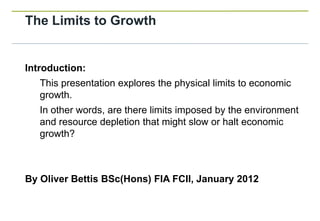
Limits to growth jan 2012 part 1
- 1. The Limits to Growth Introduction: This presentation explores the physical limits to economic growth. In other words, are there limits imposed by the environment and resource depletion that might slow or halt economic growth? By Oliver Bettis BSc(Hons) FIA FCII, January 2012
- 2. Resource and Environmental Limits to Economic Growth 1. Key concepts: we live in an exponential world 2. Resource limits to economic growth: e.g. peak oil 3. Environmental limits to economic growth: e.g.climate change 4. Making sense of the data: The Limits to Growth 5. Prosperity without growth? 6. Red pill or blue pill?
- 4. The Earth • Previous slide is view of our planet from Apollo 17. • The atmosphere is a very thin layer, less than 2% of the size of the Earth (atmosphere = 100km vs Earth radius = 6400km). http://www.nasa.gov/audience/foreducators/topnav/materials/listbytype/Apollo.17.View.of. Earth.html © 2010 The Actuarial Profession www.actuaries.org.uk
- 5. Key Concepts Exponential growth of GDP - recently The industrial revolution
- 6. Key Concepts Massive growth of World Population - recently The industrial revolution
- 7. Key Concepts Why did the industrial revolution start in England? “Energy and the English Industrial Revolution”* By Sir Edward Anthony Wrigley: – Professor of Economic History at Cambridge University – President of the British Academy from 1997-2001. • Answers question, “Why didn‟t growth stop?” • Fossil fuel allowed us to escape the limits of land. • England had easily accessible coal deposits • Adam Smith and David Ricardo would have considered as absurd the notion that economy could grow by fixed % per year. *Wrigley, E. A. (2010), Energy and the English Industrial Revolution, Cambridge University Press, Cambridge, UK © 2010 The Actuarial Profession www.actuaries.org.uk
- 8. Key Concepts The importance of energy to our economy Road transport Aviation Heating and lighting Construction Mining Food production
- 9. Key Concepts World primary energy consumption • Our industrial civilization uses about 13 Tera Watts for machinery. • Estimated net primary productivity of Earth‟s ecosystems ≈70TW on land*2. Source: BP Statistical Review of World Energy 2011
- 10. Key Concepts Why are Fossil Fuels so Useful? • Fossil fuel is very energy dense • Oil is particularly useful as it is liquid – easy to transport • Energy content of 1 barrel of oil = manual labour of 30 people for 1 month. “Energy Slaves” • UK energy consumption per person = 125kWh per day*1 (= 5.2kW per person) • 1 person produces ~ 75 Watts sustained power • UK citizens have ~ 70 “energy slaves” *1 Refer: www.withouthotair.com - David MacKay, „Sustainable Energy Without Hot Air‟
- 11. Key Concepts We are addicted to oil We are addicted to fossil fuels, especially oil. "Here we have a serious problem: America is addicted to oil, which is often imported from unstable parts of the world,“ George W. Bush, 2006 State of the Union address Source: http://articles.cnn.com/2006-01-31/politics/bush.sotu_1_energy-research-union- speech-advanced-energy-initiative?_s=PM:POLITICS
- 12. Key Concepts Exponential Growth “The greatest shortcoming of the human race is our inability to understand the exponential function” – Professor Albert Bartlett, Colorado University • The exponential function arises whenever a quantity grows or decays at a rate proportional to its current value. • For example; compound interest. Source: http://www.albartlett.org There is a great presentation about exponential growth at this web address.
- 13. Key Concepts Exponential Growth Doubling Time • Approx. doubling time = 70/(Growth Rate in %) Reason: 70 ≈ 100*ln(2) • E.g. 7% growth means doubling time of 70/7 = 10 years Resource used during doubling period For a resource which is used up at a constantly increasing rate: • In the time it takes to double the rate of use, the amount of resource used will be the same as the resource used in all prior doubling periods combined.
- 14. Key Concepts Example: 7% growth Rate of Resource Use Versus Time 1000.00 900.00 800.00 700.00 600.00 500.00 400.00 7% Growth 300.00 200.00 100.00 0.00 0 20 40 60 80 100 Time, years
- 15. Key Concepts Cumulative Resource Use @7% growth Cumulative Resource Use 16,000 10th doubling period. 14,000 Same resource used 12,000 as in previous 9 periods combined. 10,000 8,000 Cumulative 6,000 Resource Used 4,000 2,000 0 0.0 20.0 40.0 60.0 80.0 100.0
- 16. Key Concepts Is growth always good? • Imagine a business plan which says: – Increase profit margin – & increase market share at the same time • Many things have an optimal size – further growth is bad – E.g . People! Question: Is economic growth always good?
- 17. We live in an exponential world Technology and knowledge Moore’s Law The number of transistors that can be placed inexpensively on an integrated circuit doubles approximately every two years. 250,000 Utility Patents Granted in United 200,000 States 1800-2010 150,000 100,000 Intellectual Property Patents No. of patents granted illustrates the 50,000 Granted per explosive growth in human knowledge. Year 0 1800 1850 1900 1950 2000 © 2010 The Actuarial Profession www.actuaries.org.uk
- 18. We live in an exponential world World growth trends 1750-2000 1. GDP 2. Population 3. Paper consumption 4. Motor vehicles 5. Foreign investment 6. CO2 concentration 7. Loss of tropical woodland 8. Water use 9. Species extinction 10. Fisheries exploited 1750 1800 1850 1900 1950 2000 Source: New Scientist 16 October 2008 http://www.newscientist.com/article/mg20026786.000-special-report-how-our-economy-is-killing-the-earth.html © 2010 The Actuarial Profession www.actuaries.org.uk
- 19. We live in an exponential world World GDP Growth Trends • World GDP has grown at average rate of c.3% per year in recent decades. • Doubling time at 3% is just over 23 years. • From 2011 to 2100 is almost 4 doubling periods. • If growth continued at this rate, the world economy would grow 14 times as large in 2100 as it is now. © 2010 The Actuarial Profession www.actuaries.org.uk